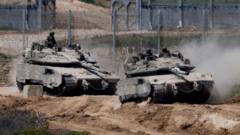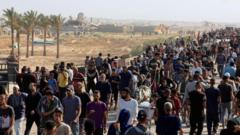Israel’s security cabinet has sanctioned a broader military offensive in Gaza, citing ambitions to capture territory and exert pressure on Hamas for the return of hostages. Preparations include mobilizing reservists and adjusting humanitarian aid distribution, drawing criticism from international organizations regarding potential violations of humanitarian principles.
Israel Intensifies Gaza Offensive Amid Controversy Over Hostage Situation and Humanitarian Aid

Israel Intensifies Gaza Offensive Amid Controversy Over Hostage Situation and Humanitarian Aid
The Israeli security cabinet has approved an expansion plan for its military operations in Gaza, intensifying efforts against Hamas while navigating criticism over humanitarian principles and the hostage crisis.
In the latest escalation of tensions in the region, Israel's security cabinet has formally approved a plan to expand its military offensive against Hamas in Gaza. This decision comes on the heels of Prime Minister Benjamin Netanyahu's cabinet discussions aimed at countering Hamas, with the military stating its intention to reshape operations by capturing territory and establishing a sustained presence, distinguishing it from previous offensive strategies.
Reports indicate that the Israeli military has called up tens of thousands of reservists, preparing for what officials described as a significant increase in pressure on Hamas, particularly with the goal of securing the release of the remaining Israeli hostages. Meanwhile, the cabinet's plans reportedly include expanding the "buffer zone" along Gaza’s borders and advancing into more areas of the territory.
However, these military operations are set against a backdrop of severe humanitarian concerns. Israel has faced backlash for its two-month blockade, which has led to dire food shortages, and a UN-led forum has raised alarms about a proposed humanitarian aid distribution system that they allege flouts fundamental humanitarian principles. Critics assert that Israel's proposed method for resuming aid distribution would only serve to reinforce control and exacerbate the current humanitarian crisis, particularly affecting the most vulnerable civilians in Gaza.
The issue of hostages looms heavily in the discussion. The Hostages and Missing Families Forum has criticized Israel's military strategy as prioritizing territorial gains over the lives of hostages, reflecting a possible disconnect between government actions and public sentiment, as a significant portion of the Israeli population reportedly desires an emphasis on the hostages' safe return.
International and humanitarian agencies, including the UN, have also urged that Israel is obligated to facilitate aid under international law, especially given the ongoing suffering of around 2.1 million Palestinians in Gaza. The scale of human suffering continues to escalate, with reports indicating that over 52,000 individuals have been killed in Gaza since the outbreak of hostilities.
As calls for a renewed ceasefire grow, the unfolding situation highlights the intersection of military objectives, humanitarian obligations, and the pressing need to address the dire circumstances facing civilians in the region.
Reports indicate that the Israeli military has called up tens of thousands of reservists, preparing for what officials described as a significant increase in pressure on Hamas, particularly with the goal of securing the release of the remaining Israeli hostages. Meanwhile, the cabinet's plans reportedly include expanding the "buffer zone" along Gaza’s borders and advancing into more areas of the territory.
However, these military operations are set against a backdrop of severe humanitarian concerns. Israel has faced backlash for its two-month blockade, which has led to dire food shortages, and a UN-led forum has raised alarms about a proposed humanitarian aid distribution system that they allege flouts fundamental humanitarian principles. Critics assert that Israel's proposed method for resuming aid distribution would only serve to reinforce control and exacerbate the current humanitarian crisis, particularly affecting the most vulnerable civilians in Gaza.
The issue of hostages looms heavily in the discussion. The Hostages and Missing Families Forum has criticized Israel's military strategy as prioritizing territorial gains over the lives of hostages, reflecting a possible disconnect between government actions and public sentiment, as a significant portion of the Israeli population reportedly desires an emphasis on the hostages' safe return.
International and humanitarian agencies, including the UN, have also urged that Israel is obligated to facilitate aid under international law, especially given the ongoing suffering of around 2.1 million Palestinians in Gaza. The scale of human suffering continues to escalate, with reports indicating that over 52,000 individuals have been killed in Gaza since the outbreak of hostilities.
As calls for a renewed ceasefire grow, the unfolding situation highlights the intersection of military objectives, humanitarian obligations, and the pressing need to address the dire circumstances facing civilians in the region.





















